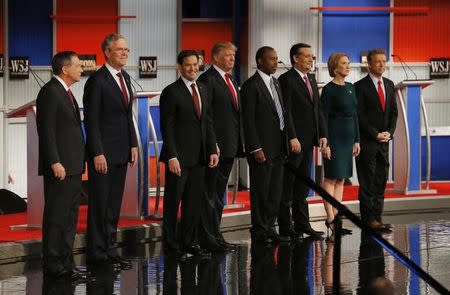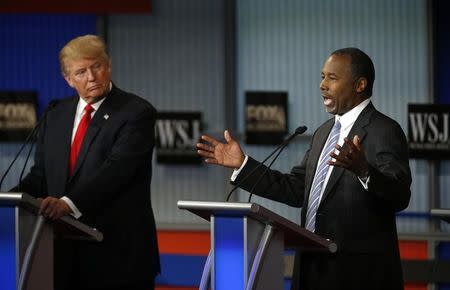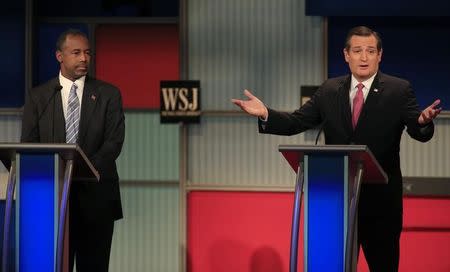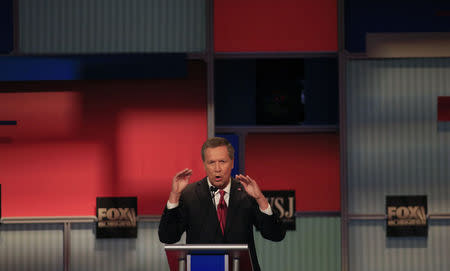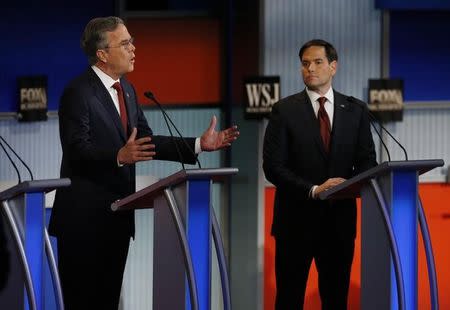Steady debate performance banishes gloom for U.S. Republican Jeb Bush
By Steve Holland, Emily Stephenson and Ginger Gibson MILWAUKEE (Reuters) - A steady performance by Jeb Bush in Tuesday's Republican debate has halted the sense of desperation around his U.S. presidential campaign and may buy him time to counter the rise of chief rival Marco Rubio. The fourth Republican debate in the search for a 2016 presidential nominee was characterized by a constant stream of attacks against front-runner Donald Trump and gaffe-free performances by Rubio of Florida and Ted Cruz of Texas, two up-and-coming U.S. senators in the race. But the most relieved candidate after the two-hour encounter inside the Milwaukee Theater was Bush, the former Florida governor who was outclassed in the three previous debates and has suffered an erosion of support from Republican voters and a drop-off in financial donations. "I thought the debate went well, and I had a good debate because I got to talk about things with a little substance instead of the cute one-liners," Bush said Wednesday morning on Fox News. In the same appearance, Bush announced he had received the endorsement of former Republican senator and one-time presidential nominee Bob Dole. The performance sent waves of excitement through Bush's donor base. "He was much improved from the prior debate and just demonstrated that Jeb is a serious candidate with the leadership skills and the experience," said Eric Cantor, the former Republican House Majority Leader who is raising funds for Bush. "I think coming out of that debate, Jeb is very well poised to really gain some momentum." Bush supporters were encouraged that he now has a month until the next debate, giving him time to work the campaign trail. "You’re getting away from the press narrative at a debate and instead focusing on reality on the ground," Cantor, who was defeated in a primary in 2014 and now works for investment bank Moelis. "Jeb has put together one of his best teams there is in Iowa." Bush moved to quickly hit the campaign trail, holding three events in Iowa on Wednesday. "This country can rise up," Bush said at a town hall meeting in the Coca-Cola bottling facility in Atlantic, Iowa. "We have to apply conservative principles to simplify the [tax] code, fix how we regulate, embrace the energy revolution in our midst rather than think it's a horrible thing." Trump, a billionaire businessman who has led opinion polls in the Republican race for months, gave Bush an opening when he said it was okay with him if Russian President Vladimir Putin "wants to go and knock the hell out of ISIS" in Syria and Iraq, a reference to Islamic State militants in the two Middle East countries. Bush, who mostly steered clear of attacking his rivals after previous attempts had fallen flat, quickly interjected. "We're not going to be the world's policemen, but we sure as heck better be the world's leader," Bush said, saying Trump's views of Putin and his policies in Syria were "like a board game. That's like playing Monopoly or something. That's not how the real world works." That Bush was able to stop the bleeding may give him time to regain his footing in the unpredictable Republican race with the next debate on Dec. 15 in Las Vegas. Bush is campaigning on Wednesday in Iowa, which on Feb. 1 holds the first nominating contest of the November 2016 election. "Jeb Bush was much improved. At a minimum, this buys him more time to reset and try to advance," said Fergus Cullen, a former chairman of the New Hampshire Republican Party. Bush campaign officials, including finance chief Woody Johnson, owner of the New York Jets, offered an upbeat message in a conference call to donors immediately after the debate. "This is a performance you can sell and help keep the fundraising going," Heather Larrison, a top aide to Bush’s campaign, told the donors, according to one participant on the call. The campaign has already planned a retreat for large-dollar donors and bundlers in Miami in early December. It is a critical time in the race for the Republican nomination, with retired neurosurgeon Ben Carson and Trump fighting to hold their spots at the top of opinion polls and Rubio trying to build on the momentum of his last strong debate performance. Rubio, 44, who is competing with Bush, 62, for establishment Republican votes, was attacked by fellow U.S. Senator Rand Paul for promoting what Paul called a $1 trillion increase in military spending. "Marco, how is it conservative to add $1 trillion in expenditures to the federal government?" Paul said. CRUZ, RUBIO BOOSTED Rubio dismissed the criticism with a promise to do what it takes to protect U.S. national security, a pledge other candidates embraced, and the crowd roared its approval. "We have to make our military bigger, better and stronger than ever before," agreed Trump. Social media rewarded both Cruz and Rubio. Cruz had the highest social media sentiment score of 59 with nearly 9,500 tweets mentioning his name during the fourth Republican debate, according to Topsy, an analytics platform that tracks and analyzes mentions and trends on social media websites Twitter and Google+. Rubio followed with 4,695 social media mentions and a score of 57. A score higher than 50 indicates there are more positive mentions of the candidate than negative ones. Trump was attacked for his immigration plan, which envisions building a wall on the border with Mexico and rounding up and deporting undocumented immigrants. Ohio Governor John Kasich and Bush both criticized Trump's plan, which many Republicans worry will alienate Hispanic voters who are vital to winning the election. "That's the problem with this. We need to win the presidency, and the way you win the presidency is to have practical plans," Bush said, adding Democratic front-runner Hillary Clinton's staff was "high-fiving" over the proposal. A Clinton campaign spokesman, Brian Fallon, tweeted during the debate that "we actually are doing high-fives right now." Carson, after a rough week of scrutiny about whether he embellished key aspects of his biography, lashed out at his critics and said he did not like being "lied about." "I have no problem with being vetted," Carson said. "What I do have a problem with is being lied about and having that put out there as true." For more on the 2016 U.S. presidential race and to learn about the undecided voters who determine elections, visit the Reuters website. (http://www.reuters.com/election2016/the-undecided/) (Additional reporting by Ginger Gibson, Megan Cassella and Alana Wise in Washington; Writing by Steve Holland and John Whitesides; Editing by Howard Goller, Frances Kerry and Ken Wills)


